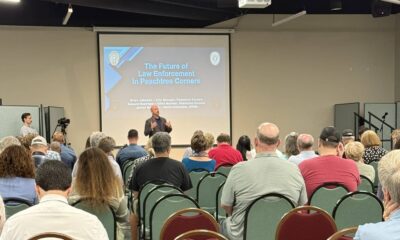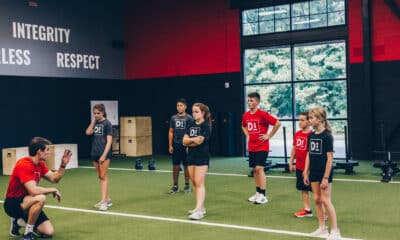City Government
Q & A on Stay-at-Home Order from the Mayor
Published
5 years agoon
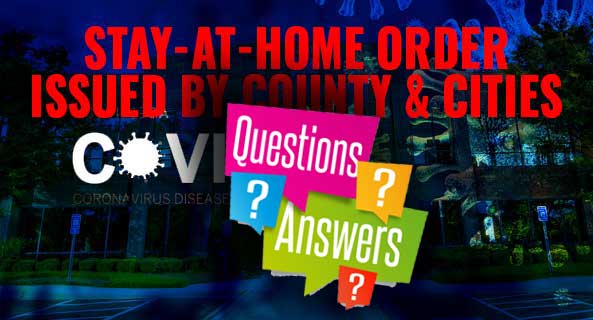
The Emergency Order becomes effective March 28
On March 17 there were 7 cases of COVID-19 in Gwinnett County. Ten days later there were 78. The very next morning there were 83. More compelling, there is a 6 to 7-day delay in getting test results, plus testing is limited to only first responders, medical personnel, and sick people. I think you get the point. As a result, when the County asked all the Cities to join them in a stay at home order, our Council was unanimous in support.
This decision was not made impulsively or without due regard for the impact on our business community. You should know by now how business-friendly we are. Rather we chose to find that balance between your health and your paycheck that we thought was in everyone’s best interest. We will do what we can for our businesses separately. For now, our health is paramount.
What is a stay at home order? Below you’ll find a basic, simplified Q&A that walks you through what it means. Please note, this list is intended as a living document. We expect lots of questions and clarifications, so do not hesitate to contact us at info@peachtreecornersga.gov, or mmason@peachtreecornersga.gov with your questions. We’ll update the Q&A as things change.
Most importantly, take this seriously. STAY HOME. We’ll be back to concerts on the Town Green before you know it.
Stay-at-Home Q&A
Q: Does this mean I must stay inside my home/apartment all the time?
A: No, the Emergency Order directs everyone to stay in their place of residence unless they leave their homes for an essential activity.
Q: What are essential activities?
A: Essential activities include:
· Grocery shopping (including restaurant takeout), picking up medical supplies or medication, visiting a health care professional or to obtain supplies needed to work from home, or to go to your place of work, only if it’s an essential business (which provides an essential activity).
· Outdoor activities such as walking, hiking, running, bicycling, and other physical activities, as long as you comply with the social distancing requirements (remain at least 6 feet apart from those other than your immediate family).
· You may also leave to care for a family member or pet in another household.
Q: What is an essential business?
A: Essential businesses include:
· Medical facilities, grocery stores, certified farmers’ markets, farm and produce stands, supermarkets, food banks, convenience stores, and other establishments engaged in the retail sale of canned food, dry goods, fresh fruits and vegetables, veterinary clinics, pet supply, fresh meats, fish and poultry and any other household consumer projects such as cleaning and personal care products.
· Restaurants that offer food only through delivery, takeout, or drive-thru.
· Establishments that sell alcoholic beverages can sell unopened bottles of liquor or wine, or new sealed growlers, curbside to takeout customers only.
· Businesses and other organizations that provide food, shelter and social services and other necessities of life for economically disadvantaged or otherwise needy individuals.
· Banks and related financial institutions.
· Hardware stores
· Plumbers, electricians, exterminators, lawn service, cleaning services, and other service providers necessary to maintaining safety, sanitation and the essential operation of residences
· Mailing and shipping services including post office boxes
· Laundromats, dry cleaners, and laundry service providers
· Businesses that supply products needed for people to work from home
· Businesses that deliver groceries, food, goods, or services directly to residences,
· Airlines, taxis, and other private transportation services providing transportation for essential activities
· Home-based care for seniors, adults, or children
Q: What is essential travel?
A: Any travel related to an essential activity, essential business or essential government functions. All other travel is restricted.
Q: Can businesses stay open as long as they comply with the 6-foot social distancing rule?
A: No, only essential businesses providing essential services may remain open.
Q: Can my children play with my neighbor’s children?
A: Only if they maintain the social distancing requirement of 6 feet.
Q: Can I socialize with my neighbors outdoors as long as we remain 6 feet apart?
A: Yes, but remember, this Local Emergency Order is necessary to protect the health and well-being of all who live and work in our city. This is temporary, we will get through this tough period, there will be plenty of opportunities to socialize if we all work together.
Q: Is the Town Green open? Can I take my family there?
A: Yes, the Town Green is open, however, the playground and restrooms will remain closed during the pandemic. Please remember to maintain the 6-foot social distance requirement.
Q: How long will this Emergency Order be in place?
A: This Emergency Order became effective at 12:01 a.m. on March 28, 2020 and will continue to be in effect until 11:59 p.m. on April 12, 2020. It may be extended, rescinded, superseded, or amended by the Mayor and City Council.
Q: The Department of Public Health has ordered that certain higher-risk population remain quarantined or shelter in place for 14 days. Who are considered at higher risk?
A: Individuals 60 and older and those who are medically fragile such as those who are undergoing cancer treatments, have heart and lung conditions, asthma, and other serious health conditions that put them at risk if exposed to the coronavirus.
Q: Is it OK to attend drive-in church services?
A: While we understand the desire of local churches to gather in worship, we encourage our churches to abide by local limits on social gatherings. Many of the large COVID-19 outbreaks occurring across our nation are directly linked to places of worship and similar social gatherings. The existing state of emergency prohibits gatherings of 10 or more people, which includes weddings, funerals, and church services. This would include a drive-in church scenario.
Q: Does this Emergency Order include a curfew?
A: No, this emergency order does not include a curfew.
Q: What is the best source for finding ways to protect me and my family during the pandemic?
A: Every day the Georgia Department of Health Services (DPH), the Centers for Disease Control and Prevention (CDC) and the Gwinnett County Health Department issue updated guidelines and information related to the coronavirus (COVID-19).
These sources are the best place to get the facts and get your questions answered. The city urges all citizens to visit these websites on a regular basis. These are the health experts who have the expertise to provide the guidance you need to keep you and your family safe.
If you want regular updates delivered to you via email, the CDC offers a subscription to an e-newsletter that provides important COVID-19 updates. To subscribe visit the CDC website and select the link labeled “Sign up for emails from CDC” located near the bottom right side of the page or use this link: https://tools.cdc.gov/campaignproxyservice/subscriptions.aspx?topic_id=USCDC_2067
Q: Is there a phone number that I can call if I have questions about the coronavirus?
A: For health questions, please keep these important telephone numbers handy:
• Georgia Department of Public Health: 404-657-2700 (information); 24/7 Public Health Emergency Line: 1-866-782-4584)
• Centers for Disease Control (CDC) 1-800-232-4636 • Gwinnett County Health Department: 770-339-4260
• The State of Georgia has a new COVID-19 hotline: 1-844-442-2681
Related
City Government
Peachtree Corners Hosts Discussion About the Future of Local Policing
Published
2 days agoon
May 12, 2025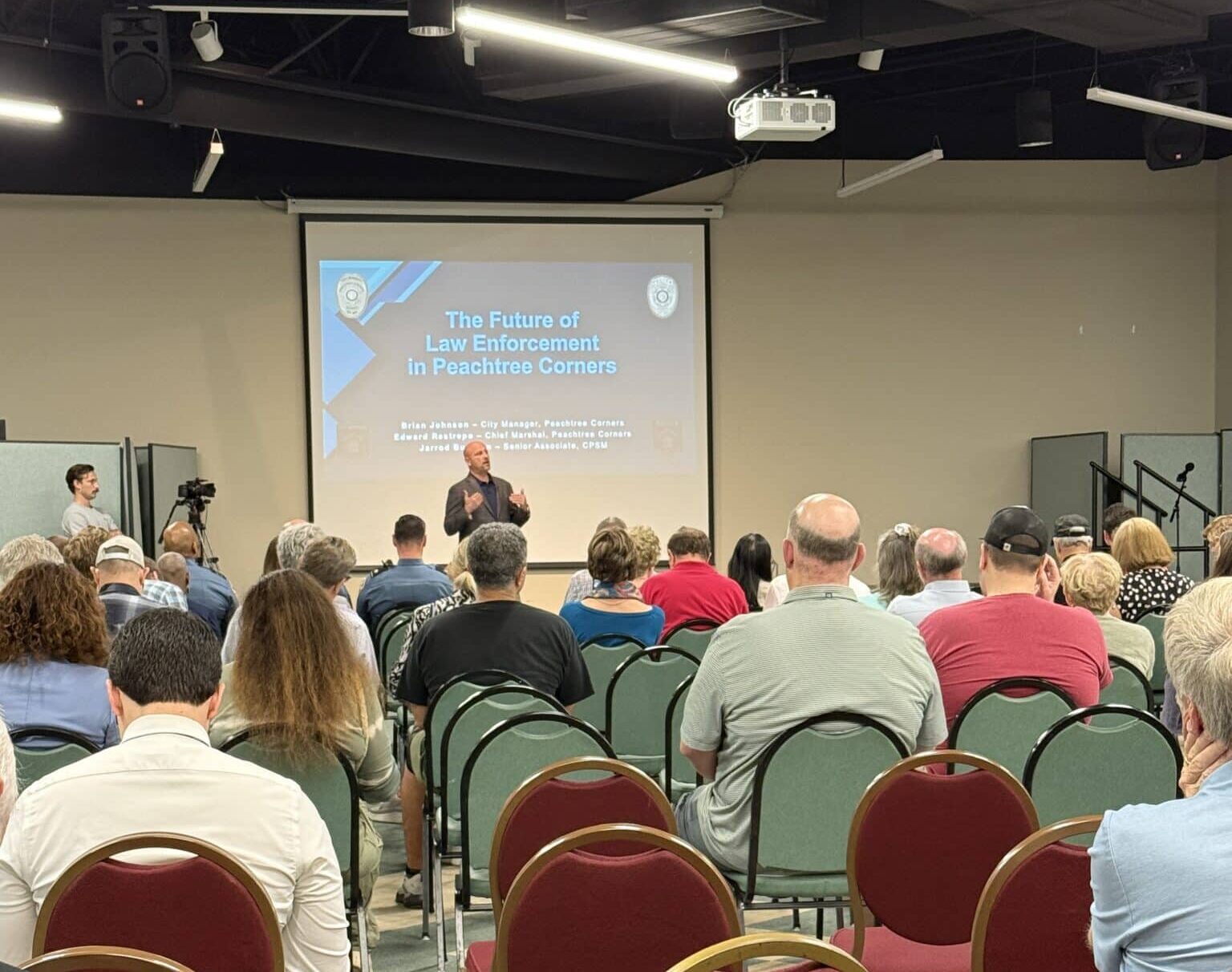
Although crime isn’t on the rise, and the Gwinnett County Police Department (GCPD) is fulfilling its role in fighting crime, the City of Peachtree Corners is asking residents, business owners and city stakeholders if they believe the city should form its own police department.
With over 100 people in attendance, City Manager Brian Johnson led the discussion about the future of policing in Peachtree Corners. He presented the findings from a survey conducted by the Center for Public Safety Management (CPSM), a nationally-recognized law enforcement consulting and training firm, as well as information about patrol officer staffing, response times, costs to tax payers and a potential timeline.
Ensuring public safety
Johnson kicked off his presentation by explaining that it is the duty of the mayor and city council to ensure public safety, including reviewing law enforcement.
“Maybe it needs to grow, maybe it needs to change its focus. But city council is the one that has the decision-making responsibility,” he said.
He was also adamant that this isn’t a done deal.

“I hit this point already, but I want to hit it again. This is the start of a conversation, a community conversation and feedback to council. There hasn’t been a decision,” he said. “Council has not received this presentation from me. They’re here to watch and learn from your feedback of this.”
Mayor Mike Mason was present at the meeting, along with all of the city council members except Eric Christ who was out of town and watching remotely.
Issues and obstacles
Johnson explained that the grounds for the inquiry were based on issues about communication, access to information and enforcement of city-specific ordinances. He cited an example where a city rule that private residences can’t be rented on a short-term basis like Vrbo or Airbnb wasn’t enforced by GCPD. An owner tried to circumvent the ordinance by only renting the outside of the house. A loud pool party ensued, and frustrated neighbors dialed 911.
“Officers showed up and they said, ‘We can’t enforce the city’s noise ordinance,’” Johnson said.
The first stage to fix this problem was creating the marshal program to bridge the gap between code enforcement and GCPD.
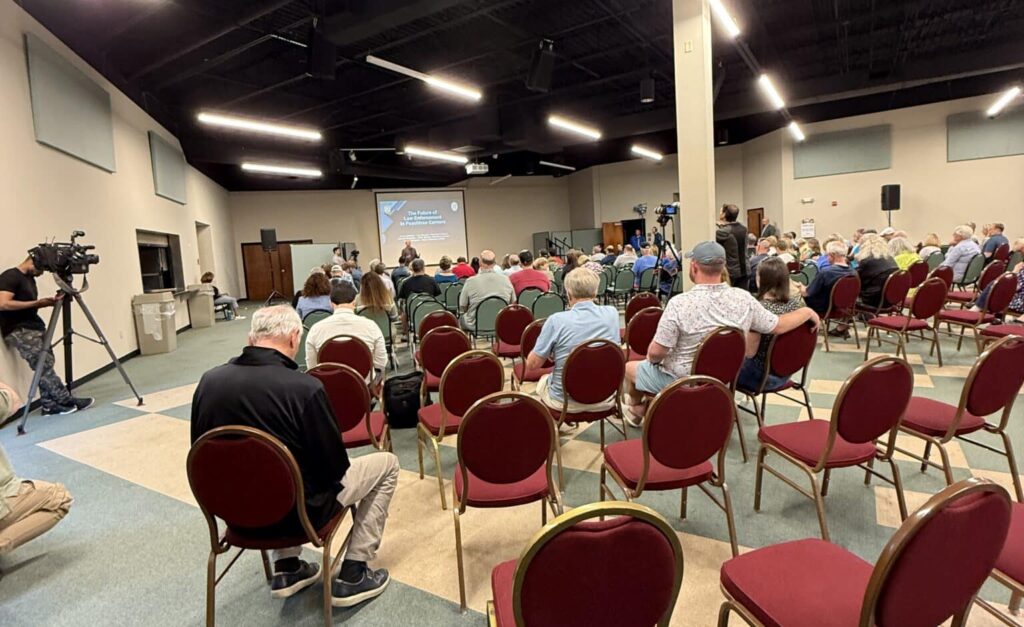
“[We thought] they would be able to enforce both local ordinance and state law, since they are a function of the city, and they could maybe be a force multiplier for Gwinnett since [marshals] don’t have to respond to 911 calls,” said Johnson.
But other issues arose shortly after the department was formed.
“We were still working towards getting that good balance, but we have been faced recently with a couple of things that make it harder for us,” said Johnson.
Seeking shared access
Instead of GCPD giving PTC marshals read-only, quick access to incident reports, dispatch calls and other information, the marshals department was required to file open records requests through the same process as any civilian.
“They were denied, as well as the city of Sugar Hill, [when] asked for the ability to see, not change, but see the computer-aided dispatch information, so that they would know where Gwinnett County police officers were; so that they could avoid stepping on their toes or maybe looking to support their efforts, and they haven’t been granted that,” said Johnson.
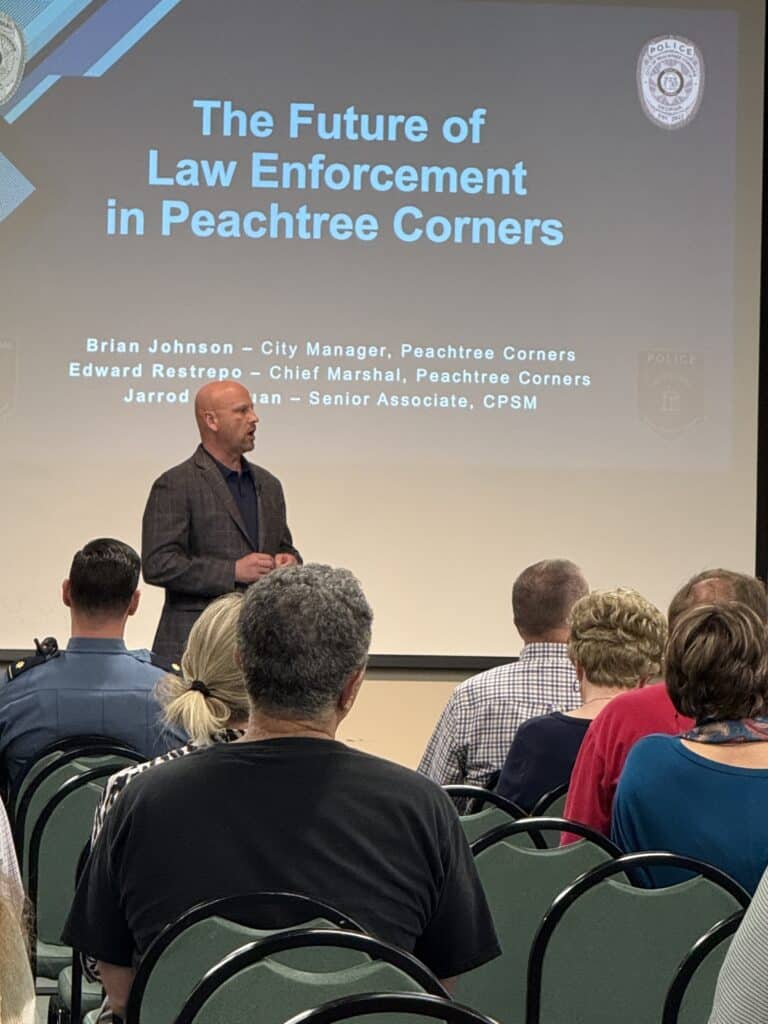
He added that the GCPD has video cameras on certain roadways that are used for various reasons, and law enforcement can use them when there’s crime in the area. Peachtree Corners marshals were denied access to those cameras.
“Conversely, we have a couple hundred cameras in the city, and we definitely want them to have access to them,” said Johnson. “So the frustration out of not being able to get that symbiosis between the marshals and police made us start thinking, all right, you know, is there another option?”
Community feedback
CPSM utilized data from GCPD to discern if Peachtree Corners could feasibly stand its own force. It also took into consideration crime trends, costs and many other factors. It recommended a 55-officer department, costing $12.1 million annually, with a $2.2 million upfront cost.
Comparing the two options to “renting vs. owning” the primary law enforcement agency in the city, Johnson presented pros and cons for each. Once the question-and-answer portion began, there was no obvious choice. Men and women, young and more advanced in age, had both similar and differing opinions.
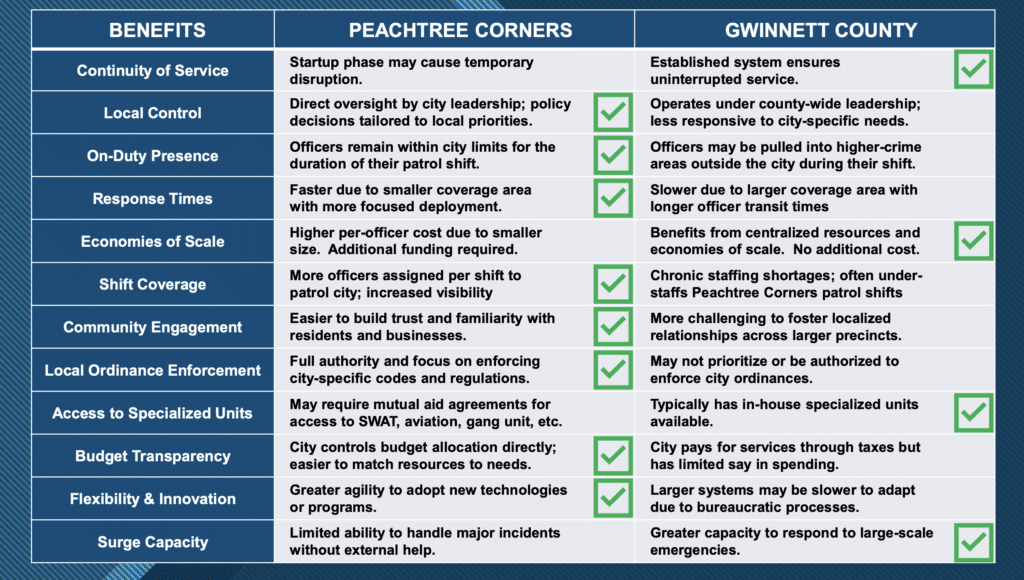
One young man, who identified himself as a local small business owner named Alexander, argued that with artificial intelligence increasing the efficiency of administrative tasks, perhaps the city wouldn’t need a full 68-man department of civilians and sworn officers.
Some accused the city of devising a solution in need of a problem. Others were concerned that paying approximately $100,00 for a study was throwing good money after bad.
But at the end of it all, the city is continuing to seek feedback and is encouraging everyone to make informed decisions. The meeting was taped and is available on the city website along with Johnson’s PowerPoint presentation, a copy of the study done by CPSM and a survey.
As far as a timeline goes, city officials would like folks to take the summer to mull it over and come back in the fall to take another look at the proposal.
Related
City Government
City of Peachtree Corners Awarded Certificate of Achievement From GFOA for Seventh Straight Year
Published
5 days agoon
May 9, 2025
The City of Peachtree Corners’ finance department has been awarded a Certificate of Achievement for Excellence in Financial Reporting from the Government Finance Officers Association of the United States and Canada (GFOA) for its 2024 financial year-end comprehensive annual financial report (CAFR).
The GFOA’s Certificate of Achievement is the highest form of recognition in governmental accounting and financial reporting, and its attainment represents a significant accomplishment by a government and its management.
It is the city’s seventh year of receiving the award and represents a significant accomplishment by the city’s finance department and its leadership.
According to a GFOA release, “The report has been judged by an impartial panel to meet the high standards of the program, which includes demonstrating a constructive ‘spirit of full disclosure’ to clearly communicate its financial story and motivate potential users and user groups to read the report.”
“We are pleased to again receive this honor,” said City Manager Brian Johnson. “Our finance department, and Finance Director Cory Salley, are to be commended for this achievement, as it is the highest form of recognition GOFA presents.”
A comprehensive annual report
The city’s finance department produces the CAFR each year and works with independent auditors to verify the city’s financial situation and standing.
“This prestigious award affirms Peachtree Corners’ dedication to exceeding basic requirements by producing comprehensive annual financial reports that reflect a strong commitment to transparency and full disclosure,” said Assistant City Manager Brandon Branham.
About the GFOA
The Government Finance Officers Association (GFOA), founded in 1906, represents public finance officials throughout the United States and Canada.
The association’s more than 20,000 members are federal, state/provincial and local finance officials deeply involved in planning, financing and implementing thousands of governmental operations in each of their jurisdictions. GFOA’s mission is to advance excellence in public finance.
To learn more about the GFOA, visit gfoa.org.
For more about the City of Peachtree Corners, visit peachtreecornersga.gov.
Related
City Government
The Future of Law Enforcement in Peachtree Corners: Community Meeting
Published
1 month agoon
April 14, 2025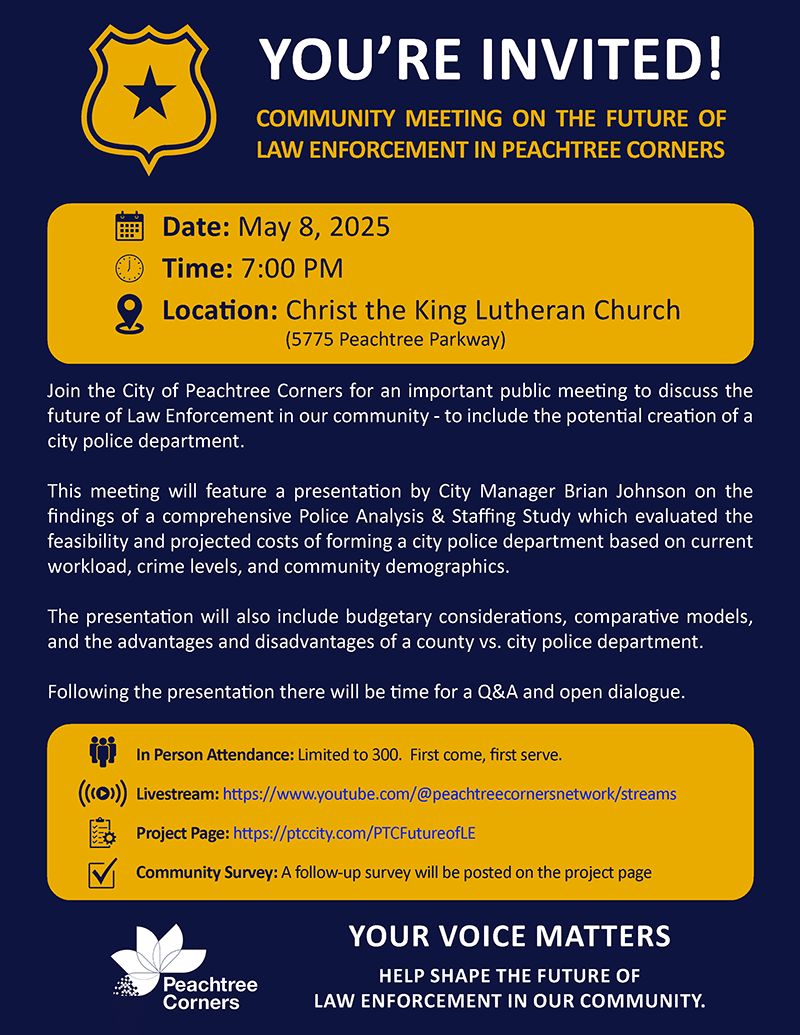
The City of Peachtree Corners will hold an important public meeting on May 8 to discuss the future of law enforcement in our community — including the potential creation of a city police department.
This meeting will feature a presentation by City Manager Brian Johnson on the findings of a comprehensive Police Analysis & Staffing Study that evaluated the feasibility and projected costs of forming a city police department based on current workload, crime levels and community demographics.
The presentation will also include budgetary considerations, comparative models and the advantages and disadvantages of a county vs. city police department.
Following the presentation, there will be time for a Q&A and open dialogue.
In-person attendance is limited to 300. First come, first served. A livestream option will be available for those who can’t attend in person.
After the meeting, a follow-up survey will be available on the city’s project page.
Meeting details
The Future of Law Enforcement in Peachtree Corners
Date/Time: May 8, 2025 at 7 p.m.
Location: Christ the King Lutheran Church (5775 Peachtree Parkway)
For more information, visit peachtreecornersga.gov.
Related
Read the Digital Edition
Subscribe
Keep Up With Peachtree Corners News
Join our mailing list to receive the latest news and updates from our team.
You have Successfully Subscribed!

Digital Edition

Official City Merchandise Line Debuts This Saturday at Town Green

Paul Duke STEM High School Student Earns CGO Scholarship

World Blood Donor Day Starts Here: Theo’s Miracle, Katherine’s Mission [Podcast]

Executive Function: A Tribute to Working Moms

Peachtree Corners Grows Business Opportunities Through Economic Development

Simpson Elementary Marks Exceptional Children’s Week

Peachtree Corners Hosts Discussion About the Future of Local Policing

Atlanta’s Dog Howl-O-Ween Festival Moving to Peachtree Corners for 2025

D1 Training Brings New Fitness Concept to Peachtree Corners

Peachtree Corners Hosts Discussion About the Future of Local Policing

City of Peachtree Corners Awarded Certificate of Achievement From GFOA for Seventh Straight Year

Simpson Elementary Marks Exceptional Children’s Week

Executive Function: A Tribute to Working Moms

Official City Merchandise Line Debuts This Saturday at Town Green

Peachtree Corners Grows Business Opportunities Through Economic Development

Light up the Corners [Video]

Capitalist Sage: Business Leadership in Your Community [Podcast]

Cliff Bramble: A Culinary Adventure through Italy

Top 10 Brunch Places in Gwinnett County

A Hunger for Hospitality

THE CORNERS EPISODE 3 – BLAXICAN PART 1

Top 10 Indoor Things To Do This Winter

The ED Hour: What it takes to Remove Barriers from Education







